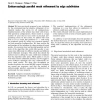Free Online Productivity Tools
i2Speak
i2Symbol
i2OCR
iTex2Img
iWeb2Print
iWeb2Shot
i2Type
iPdf2Split
iPdf2Merge
i2Bopomofo
i2Arabic
i2Style
i2Image
i2PDF
iLatex2Rtf
Sci2ools
93
Voted
EWC
2006
2006
Embarrassingly parallel mesh refinement by edge subdivision
We have previously proposed a new technique for the communication-free adaptive refinement of tetrahedral meshes that works for all configurations. Implementations of the scheme must deal with all possible geometric configurations, which results in a large number of cases that in turn result in practical programming issues. In this article, we address this issue with a Python script that generates C++ code using the symmetric group S4 acting over canonical topological and geometric configurations. We then analyze the performance of the technique by characterizing (a) mesh quality, (b) execution time and parallel speedup, and (c) traits of the algorithm that could affect quality or execution time differently for different meshes and different mesh refinement strategies. This article also details the method used to debug the many subdivision templates that the algorithm relies upon. Mesh quality is on par with other similar refinement schemes, and we suggest a more elaborate technique th...
Related Content
| Added | 12 Dec 2010 |
| Updated | 12 Dec 2010 |
| Type | Journal |
| Year | 2006 |
| Where | EWC |
| Authors | David C. Thompson, Philippe P. Pébay |
Comments (0)

